The Libraries’ Pentair Fellowship: An Extraordinary Experience (Pt. 1)
Over the past four years, a partnership between Pentair and the Libraries has created vital, inspiring opportunities for NC State graduate students. This story features the first five Pentair Fellows; stay tuned for our June issue for features on the next three Fellows.
In 2016, the Pentair Foundation awarded the NC State University Libraries a grant to develop STEM-related programming and instruction for underrepresented groups at NC State. One of the many things that have resulted from this now four-year relationship is the Pentair Fellows program.
While in this program, graduate students develop a curriculum for, and teach, workshops on STEM tools and technologies. These workshops address knowledge and skills gaps that often deter students from pursuing STEM fields. Because they are free and are taught by their fellow students, these workshops lower barriers of entry to the STEM resources students need to succeed. The Fellows also create parallel online tutorials for students to access remotely when studying abroad, working on internships in the field, or otherwise unable to attend in person.
In addition to gaining valuable teaching experience, Fellows also acquire a variety of new expertises in basic and emerging technology and tools.
The Fellows have also engaged with the Libraries and NC State faculty on some incredible projects in our Makerspace, Virtual Reality (VR) Studio, Dataspace, and other high-tech and immersive spaces. From 3D-printed molecules to a VR seed library to virtually marching with Martin Luther King, the Pentair Fellows have developed portfolios that make them more competitive in the job market and better equipped to solve society’s grand challenges.
MEET THE FELLOWS:
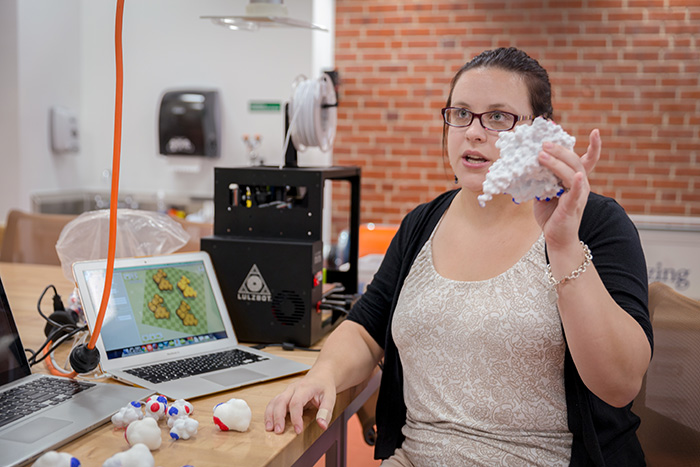
KAT COOPER
“I’m focused on developing materials that will improve students’ understanding of the most basic chemical properties and how molecules interact” Cooper says. “There are prevalent misconceptions that students have in general chemistry, and unfortunately they stick around all the way through biochemistry.”
To combat these misconceptions, Cooper, a Ph.D. student in Chemistry, leveraged her Pentair Fellowship to develop a curriculum focused on making tactile models demonstrating those properties and interactions. She also created a handout covering tools and workflows for 3D printing molecules, which has been distributed in large undergraduate chemistry courses.
This next-generation representation of a molecule is just one of an increasing number of ways that students and faculty in the hard sciences at NC State are using the 3D-printing capabilities of the Libraries’ Makerspaces to improve learning experiences and create innovative instructional materials in fast, cost-effective ways.
“Professors assume that students learn molecular interaction the first time around,” Cooper says. “But we’ve looked at students’ understanding of the concept across several institutions across the country, and we see the same incorrect ideas keep cropping up.”
“Every model’s got a purpose, and every model’s got drawbacks,” Cooper says. “Everything’s so tiny in chemistry that you can’t just look at it, so we have to do models and representations. The traditional ball-and-stick models are nice because you can take them apart and put them back together. But I’m working on what’s going on between molecules. I feel it’s more interesting for students to see that this is what the space of a molecule actually looks like.”
In addition to representing molecular interactions, the 3D-printed molecules also offer a scale advantage. You’d need a gymnasium to hold a ball-and-stick model of some complex molecules. “When you get up to the protein level, ball-and-stick models just aren’t going to work.”
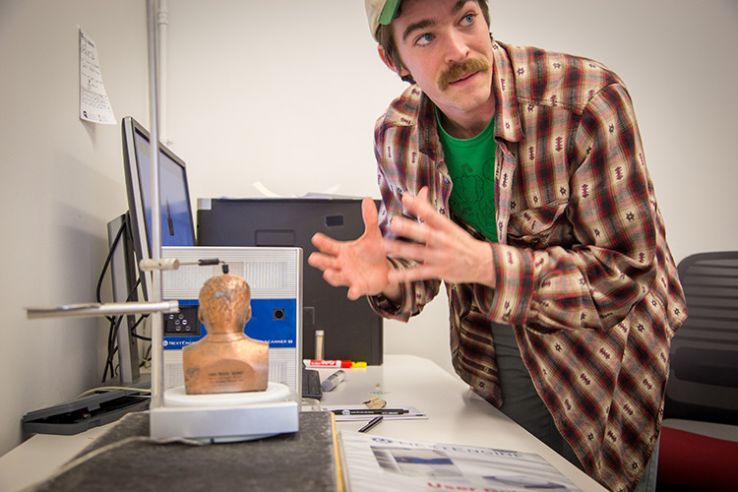
COLIN KEENAN
Spurred on by an interest in technobotany—the intersection of plant study and technology—Keenan applied for a Pentair Fellowship while working on his Master’s in Plant Biology. Driven to provide off-campus access to NC State’s Herbarium—as he describes it, a beautiful room of lockers on rollers chock full of diverse plant samples—Keenan began leveraging the Libraries 3D scanning capabilities to digitize a variety of seeds.
While working on this project, he found himself wondering if there might be another person on campus somewhere doing something similar, someone who could be a resource or a sounding board for his project. But when he heard about the Pentair Fellowship opportunity, he decided to become that person.
“I’m a good case study of somebody who would be using the Libraries’ 3D scanning resources in their research,” Keenan says. “And what we needed was someone to help someone like me if they hit any roadblocks in their work—problem solving that a researcher shouldn’t have to do for their work, but somebody on the other side could.”
Keenan’s work as a Pentair Fellow has been essential in improving the Libraries’ 3D scanning tools and services, which support a broad range of disciplines including anatomy, archaeology, history, industrial design, forensic anthropology, and mechanical engineering. Keenan developed tutorials on various scanning methods, supported student and faculty work in one-on-one consultations, and taught workshops at various levels.
“In my fellowship capacity, a lot of my work started from the experience of trying to do this research and kind of seeing where there are resources and where there aren’t. I asked myself, say you were to do your work all over again? What is your dream scenario? What would have been awesome to have had when you first showed up? This is as a professional training program for a profession that doesn’t exist yet.” One that Keenan seems to be inventing on his own.
In fact, Keenan has the distinction of becoming the first Pentair Fellow to join the Libraries as a full-time staff member. In his new role as University Library Technician in the Learning Spaces and Services Department, Keenan has continued to develop his VR expertise. He recently received a $44,000 grant from the American Society of Plant Biologists to develop learning experiences in VR related to plant biology and photosynthesis.
Keenan was also recently selected, for the second year in a row, to attend the MIT Reality Hack—one of the biggest software development events in the VR world. Keenan’s team won a major category, as well as the biggest cash prize ever awarded at a VR hackathon, for their concept of “spatial hashtags”—hashtags floating in the augmented reality air around you as you walk through a room!
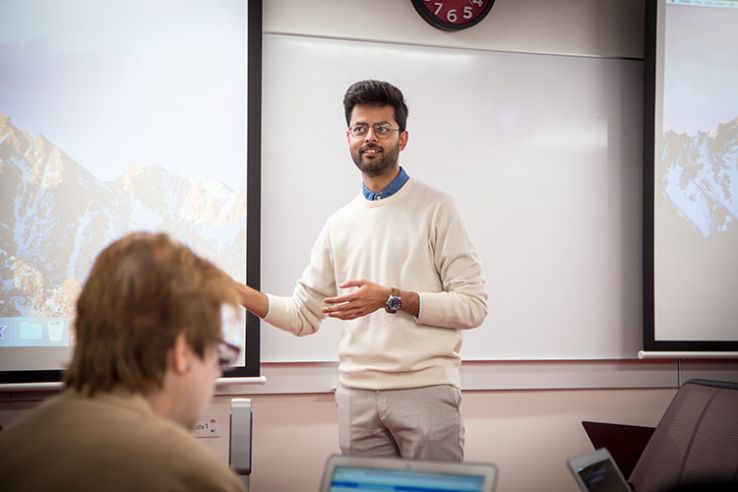
PAYOD PANDA
Panda, a Ph.D. student in Graphic Design, was a Pentair Fellow in the area of Data Visualization and Creative Coding. As a Fellow, he developed and taught workshops to interdisciplinary audiences. Panda also led a 3-hour hackathon-style learning workshop on Creative Coding and has done a lot to help his peers in the College of Design learn coding and acquire visualization skills.
But Panda’s stint as a Pentair Fellow was not his first with the Libraries. “I’ve actually been really lucky. I have been working with the Libraries for three and a half years now.” What he has found is that, in the Libraries, being curious and asking questions and meeting as many people as possible, typically leads to interesting projects. Panda has engaged with the Libraries’ Code+Art initiative, collaborated with the Libraries to exhibit visualization and virtual reality work at NC State’s Gregg Museum of Art and Design, and has co-presented his various projects and led workshops at a variety of conferences and festivals including Durham’s own Moogfest.
“In general, creating this network of people and projects is one of the best things that has happened for me during my time at the Libraries.”
This network, combined with his inquisitiveness, eventually led Panda to apply for the Pentair Fellowship. He was brought on in that capacity to both continue offering some of the workshops that the Libraries already offered—like ones for Tableau, a data visualization tool—and to leverage his expertise to create new offerings as well.
According to Panda, his “biggest contribution to the Libraries during the Fellowship was the creation of the D3 workshop.” D3.js is a JavaScript library for producing dynamic, interactive data visualizations in web browsers. “People are realizing the importance of data visualization to communicate their research to people. And it’s especially great for people who are very deeply specialized in their field but want to communicate what they’re finding to people who are not. That’s the whole point...if you’re finding something but nobody else is getting to know about it, you might as well not have done the research.”
Panda’s 3-hour hackathon-style learning workshop on Creative Coding, called the “Creative Coding Learnathon,” taught participants, the majority new to coding, how to create digital art with code. In connection with leading the learn-a-thon, Payod served as a liaison between the newly-formed Creative Coding Collective on campus and various colleges, particularly the College of Design, to connect the group to potential new members and to get students interested in the value of computational thinking in everyday life.
“The most valuable thing for me, especially as a Ph.D. student, was to get to create a curriculum for people. And the kind of support that you get at the Libraries...the staff. When I was creating these workshops, I would demo them for staff, and I would get really, really good feedback both about the content of the workshop and about my teaching style. What are the assumptions that I make when I’m creating a curriculum of content and what are the things that I have to pay attention in order to be clear to people?”
When asked how the Pentair Fellowship and his time at the Libraries has shaped his career aspirations, Panda painted a pretty clear picture of where he wants to be. “I want to do research for a tech company that does cutting-edge research in virtual reality. I want to figure out how to design new interfaces that make use of these modes of thinking in order to teach people something with VR.”
“Right now is the time to define the metaphors that will always be associated with this new medium. The way we define these new interactions, modalities, and metaphors might set the tone for a really long time. I want to be working on a team that’s looking at these problems and trying to make these new, paradigm-shift sort of interfaces. That’s my dream.”
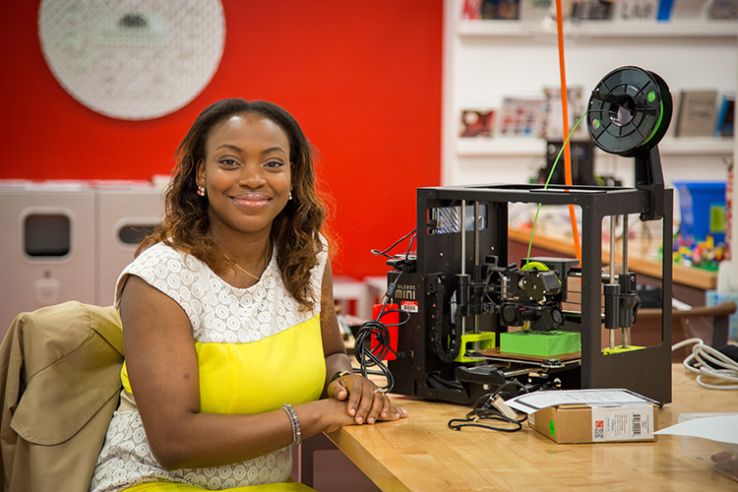
RUTH OKOILU
“Machine learning,” explains Okoilu, “leverages historical data to solve problems...patterns in data that normally humans will not see. For example, when a computer is trained to learn what a cancer cell looks like, it can detect cancer cells faster than we can.”
During her Pentair Fellowship, Ruth Okoilu, a Ph.D. student in Computer Science, designed a hands-on introductory workshop on machine learning that is accessible to both experienced coders as well as non-coders, using both R and Python—programming languages that can be used for statistical computing and graphics. She also developed a free, online tutorial on machine learning with R through the popular online data science learning website, Data Camp.
In order to expose more undergraduates to machine learning concepts, the Libraries has worked with Dr. Srini Krishnamurthy in the Poole College of Management to integrate the workshop content Okoilu developed into one of the courses he teaches, with the intention that it could be offered on a yearly basis.
After completing her undergraduate degree in computer science in her home country of Nigeria, Okoilu worked in industry for two years as the head of mobile apps development for an IT company. In this role she was flooded with data from government agencies, aviation centers, and electricity monitoring centers. Wanting to leverage this data in insightful ways, Okoilu took online courses on R and Python and other tools and was able to provide valuable analysis for her company of all this data they were compiling.
This empowering experience led her to explore Ph.D. programs in computer science, leading her to NC State. Once here, while looking for internship opportunities, she applied for the Pentair Fellowship. Although she applied for an instructional position focused on visualization and data science, the Libraries was excited about her resume and the experience she had and asked her if she’d be interested in helping create machine learning and coding instruction for undergraduates.
She was more than happy to oblige. “I got to do what I love to do—play around with data, and create machine learning content and AI content. I got to give lectures on the concepts and algorithms involved in machine learning and come up with quizzes for undergrad students. I got to create video tutorials and have those put on the Libraries’ website.”
Okoilu’s time at NC State, and her experience in the Pentair Fellowship, has certainly fueled her enthusiasm for data and machine learning. “Research is my passion. I love to research...in the school environment or in industry. I’m open to both. If I have an opportunity to be a professor at a university, I would gladly take it, as long as I am doing research and imparting knowledge to other people. I would like to be part of the community that teaches machine learning and data science. If that’s creating state-of-the-art applications and being a researcher for some very good IT company, I would like to do that as well.”
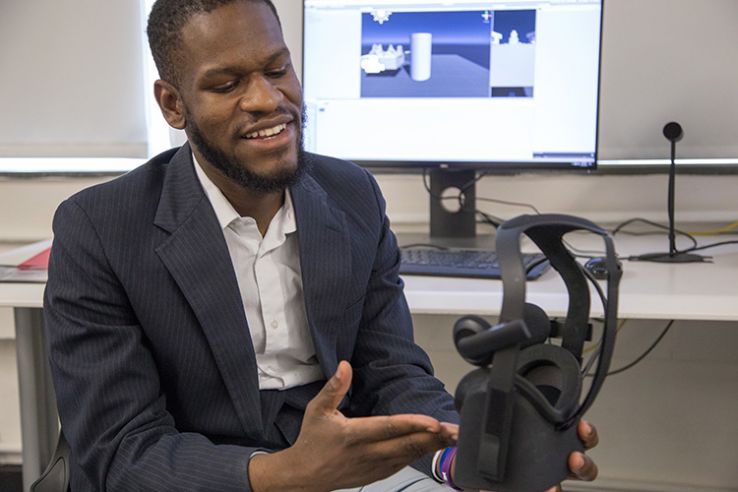
SHADRICK ADDY
“No matter what your discipline is, you can use VR (virtual reality) to assist in some way,” according to Addy, a Master’s student in the College of Design. “Whether it’s teaching people new skills or using experiences to showcase different aspects of what it is your research is based on.”
Addy spent his Pentair Fellowship teaching newcomers to augmented and virtual reality how to create their own ar/vr environments. “That was my main goal...how do we make more people not just consumers of technology but also producers. Don’t just come in here and play games, but also come here and make content.”
Originally from Liberia in West Africa, Addy came to NC State after doing his undergraduate work at Elizabeth City State University a few hours northeast of Raleigh. Drawn to the VR work of College of Design professor Derek Ham, Addy knew he wanted to work in this exciting medium. Well, sort of. “I actually was a little more hesitant and kind of fearful. But once I started seeing the affordances and the potential of the technology I gravitated towards it.”
The project that captured Addy’s imagination was Ham’s I Am a Man experience depicting the Memphis sanitation workers strike of 1968 and Dr. Martin Luther King Jr.’s subsequent assassination. ”That’s actually how I came to get this fellowship.” Ham was waiting to hear from Oculus—a technology company specializing in virtual reality hardware and software—about its Launch Pad Scholarship, for which he had submitted the I Am A Man project. Resources from this scholarship would eventually allow him to secure rights to newsclips, songs, and other intellectual property used in an exhibition of I Am a Man at the National Civil Rights Museum for MLK50—a year-long series of exhibits, events, and activities to memorialize the 50th anniversary of King’s assassination.
“I was a teaching assistant for the students who designed the physical exhibition space in which the VR station would be hosted when this Pentair Fellowship opened up, and Dr. Ham recommended it.” Addy’s job was to design a virtual environment of the physical museum space they were assigned for the exhibition. “I put that space into virtual reality so the team could actually go in and see to scale the space that their design would be exhibited in—a virtual reality of the physical space in which museum-goers were going to experience their virtual exhibit. It’s pretty meta.”
But that’s exactly how Addy views virtual reality—as a tool that one can apply to nearly any educational opportunity. For him, the fellowship has really focused his thesis project on the educational aspects of VR. “I want to be able to use VR in Africa, in those environments where the education system is not up to par, where they have inadequate learning experiences and environments and resources. I want to be able to use VR to help with the educational system.”
“I’m looking at how VR can preserve intangible elements of culture, like dance or music, things you can’t necessarily see or touch, in an educational setting. As you get further and further away from a historical moment, it becomes more and more abstract. I think VR allows you to experience the emotions or the intensity of these moments.”
Addy taught four workshops during his fellowship and said that after each, he would get follow-up emails asking more and more in-depth questions, as attendees immediately were able to see the relevance of VR in their work.
“I think this happening in the library is essential for our school. I go to a lot of conferences to give presentations about the I Am a Man VR experience, and a lot of my colleagues from other schools come and tell me that they don’t have what we have here at NC State. So I think just having this resource...it’s very important for our institution.”
